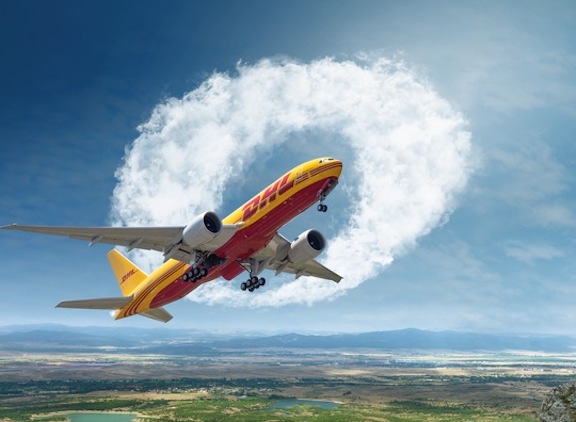DHL Express has announced a significant step towards decarbonizing aviation logistics and being more sustainable. DHL has confirmed new strategic collaborations with bp and Neste, to provide more than 800 million liters of Sustainable Aviation Fuel (SAF) to DHL Express within the next five years, with the new agreements forming one of the largest SAF deals in aviation to date. These deals, together with the previously announced SAF introduction in the DHL network in San Francisco (SFO), East Midlands (EMA) and Amsterdam (AMS), will exceed 50 percent of DHL Express’ target to reach 10 percent SAF blending for all air transport by 2026. DHL expects the strategic collaborations to save approx. two million tons of carbon dioxide emissions over the aviation fuel lifecycle – equivalent to the annual greenhouse gas emissions of approx. 400,000 passenger cars.
DHL Express transports more than 480 million urgent documents and packages annually across its global network of 220 countries and territories. Simply said, with the 800 million liters, the approx. 1,000 annual DHL flights on the route between Cincinnati, USA and Leipzig, Germany, could be operated by Boeing 777s for approx. 12 years, assuming a 100 percent SAF usage. In total, this corresponds to 12,000 carbon neutral long-haul flights.

“As the world’s leading logistics provider, it is our commitment to provide green and more sustainable solutions for our customers. The landmark SAF deals with bp and Neste mark a significant step within the aviation industry and validate the framework of our Sustainable Roadmap”, says Frank Appel, CEO Deutsche Post DHL Group. “Using SAF is currently one of the aviation industry’s key routes to reducing CO2 emissions over the aviation fuel lifecycle with currently available aircraft types.”
Martin Thomsen, SVP, Air bp, says: “We are proud to complete this important deal which further deepens our strategic relationship with Deutsche Post DHL Group. As bp transitions to an integrated energy company, we are leveraging our value chain encompassing feedstocks, global production, logistics and airport infrastructure. Not many companies also have the trading and commercial expertise in SAF, needed to design and deliver solutions for complex customer needs. Our ambition is to work even more closely with airports and airlines on decarbonization options, and we are promoting SAF at pace to support global aviation to realize its lower carbon ambitions.”
In its Sustainability Roadmap, Deutsche Post DHL Group has committed to using 30 percent of SAF blending for all air transport by 2030. Both suppliers will provide SAF produced from waste oils. Such SAF from wastes and residues can provide greenhouse gas emission reductions of up to 80 percent over its lifecycle compared with the conventional jet fuel it replaces, thereby reducing DHL’s carbon footprint. In order to ensure that the fuel is sustainable, the use of feedstock which competes with food production or causes indirect land-use change is being avoided.
“With every SAF deal, we are increasingly aware of the huge task that lies ahead in utilizing more sustainable solutions to help our customers. Not a day goes by without our customers asking us about low-carbon logistics solutions and to partner them in our joint aspiration to be part of creating a more sustainable future”, says John Pearson, CEO DHL Express. “The new SAF deals with bp and Neste are milestones on this journey. Our key focus is to inspire more SAF suppliers to address the current supply gap. At the same time, we are calling on policy makers to set the right framework to accelerate market ramp up of SAF in the EU and worldwide, including an accounting mechanism that allows flexible SAF purchases and usage.”
“This milestone agreement, our largest ever for SAF, underlines the growing need and urgency – as well as the commitment – to act on aviation-related emissions. We are pleased to take this significant step together with DHL, which shows the joint ambitions of both companies and is further progress in our journey towards creating a healthier planet for our children,” says Peter Vanacker, President and CEO of Neste. “Today’s announcement also reflects how we are concretely helping customers reduce greenhouse gas emissions by at least 20 million tons of CO2 annually by 2030. SAF is a cornerstone of the aviation industry’s efforts to achieve net-zero emissions by 2050. It requires a joint effort across the aviation value chain with all stakeholders, using all available raw materials and solutions, to reach that goal.”
DHL Express aims to expand its partnerships with Sustainable Aviation Fuel suppliers in the future and continuously increase the SAF percentage in its air transport. DHL remains committed to support innovative technologies to significantly reduce aviation's greenhouse gas emissions as stated in Deutsche Post DHL Group’s Sustainability Roadmap.

Follow us on social media: